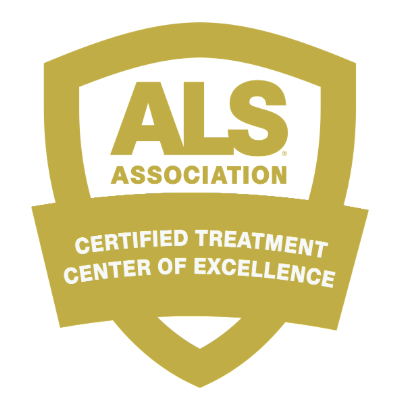 The UAB ALS Multidisciplinary Clinic has been designated a Certified Treatment Center of Excellence (CTCE) by the ALS Association, a recognition that underscores its commitment to providing the highest standard of care for patients and families living with ALS.
The UAB ALS Multidisciplinary Clinic has been designated a Certified Treatment Center of Excellence (CTCE) by the ALS Association, a recognition that underscores its commitment to providing the highest standard of care for patients and families living with ALS.
At this multidisciplinary clinic, experts in neurology, respiratory therapy, physical therapy, occupational therapy, speech therapy, psychology, nutrition, and social work work together to deliver coordinated, comprehensive care under one roof.
Led by Nan Jiang, M.D., Ph.D., associate professor in the UAB Department of Neurology and director of the UAB ALS Clinic, with the foundational contributions of Mohamed Kazamel, M.D., and the visionary leadership of department chair and professor, David Standaert, M.D., Ph.D., the clinic continues to expand both multidisciplinary care and research initiatives. With support from the state of Alabama, it is broadening access to comprehensive care while strengthening its role in ALS research and discovery.
What this means for ALS Care at UAB
The UAB ALS Clinic being designated as a CTCE means it has met rigorous standards for delivering high-quality, comprehensive care to people living with ALS. This recognition not only enhances the care UAB provides today but also drives the science that will shape tomorrow’s ALS therapies.
“Patients benefit from a true multidisciplinary approach that follows established best practices for diagnosis and management,” Jiang explained. “The clinic also provides access to clinical research and trials, giving patients the opportunity to participate in advancing new therapies.”
Beyond medical care, the team brings deep expertise in managing the challenges of ALS and offers strong support for patients and families, including education, counseling, and connections to community resources.
A unique model of support
The UAB ALS Clinic has built a distinctive support model that combines expert care, research opportunities, and family resources. The clinic offers fully integrated care in one setting, making the process easier for patients and ensuring seamless coordination.
“Our goal is not only to address the medical aspects of ALS but also to improve quality of life and empower patients throughout their journey,” Jiang added.
In addition, the clinic offers a dedicated monthly second-opinion ALS clinic, offering comprehensive evaluations for individuals with a possible or uncertain ALS diagnosis.
Advancing ALS research
The clinic is actively involved in multiple research initiatives aimed at deepening the understanding of ALS and accelerating new therapies.
- ALL ALS study: With funding from the NIH and being one of 35 research sites nationwide, UAB participates in this large-scale, inclusive project that combines longitudinal natural history studies with biomarker collection to unlock the molecular and genetic mechanisms of ALS.
- HEALEY ALS Platform Trial: Led by Massachusetts General Hospital, this collaborative initiative gives UAB patients the opportunity to access investigational therapies through the Expanded Access Program, even if they do not meet traditional clinical trial criteria.
- ALS clinic database and biobank: UAB is developing a centralized database and biobank to store and manage clinical and biological data, a resource that will be essential for future clinical trial readiness.
In addition, the clinic works closely with Peter King, M.D., professor in the Department of Neurology and internationally recognized ALS expert, conducting translational research to identify biomarkers of ALS.
Future goals for patient care and research
Looking ahead, the clinic has two primary goals that will ultimately benefit patient care and research.
“For patient care, we want to continue expanding access to comprehensive, multidisciplinary services and make the clinic experience as seamless and supportive as possible,” Jiang stated. “On the research side, we aim to grow our participation in national and international clinical trials, strengthen our own ALS patient database, and build collaborations that accelerate the development of new therapies.”
Ultimately, the clinic strives to improve patients' quality of life today while advancing research that brings hope for tomorrow.